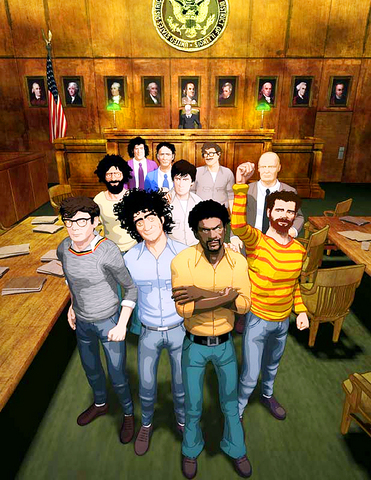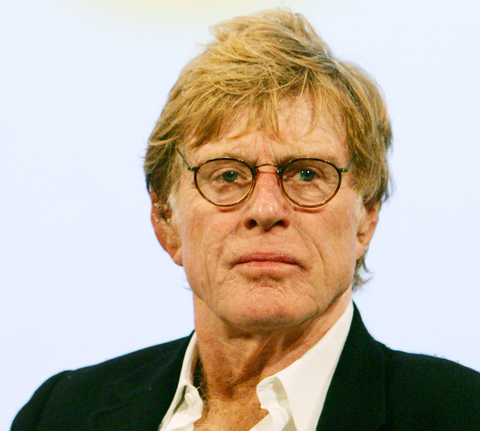Films about Iraq, Hurricane Katrina and the environment are among a crowded lineup as the 2007 Sundance Film Festival swung into gear this week.
The 10-day snow-covered extravaganza formally got under way yesterday with a screening of the hard-hitting documentary Chicago 10, which depicts the violence that erupted around the 1968 Democratic National Convention.
The US movie is one of 122 feature films to be shown at the festival, which has steadily grown in size since its launch in 1981 and now attracts hordes of movie industry heavyweights, celebrities and media.

PHOTO: AP
Geoffrey Gilmore, the director of the Sundance Film Festival, said this year's event promised to offer a more global perspective, offering 82 world premieres with films from 25 countries.
While the festival is traditionally viewed as a marketplace for independent filmmakers to showcase their talent, several eagerly anticipated films premiering at the event feature established Hollywood stars.
Hollywood mainstays such as Samuel L. Jackson and Justin Timberlake headline Black Snake Moan while Michael Douglas gets festival top billing in King of California.

PHOTO: AP
Meanwhile, John Cusack offers a powerful performance in Grace is Gone, about a patriot father whose wife is killed in Iraq.
Queen Latifah has the leading role in Life Support, a film about drug addiction, while stars Nick Nolte and Roy Schieder lend their voices to Chicago 10.
Star talent helps but movie moguls will also be searching for the next commercial gem or innovative buzz film of the year such as Little Miss Sunshine, Napoleon Dynamite or Super Size Me.

PHOTO: AFP
This year's films were selected from 3,287 feature submissions.
The Sundance Film Festival is the premier exhibition for US and international independent film.
The festival is the centerpiece of the Sundance Institute, a nonprofit cultural organization founded by movie icon Robert Redford in 1981. Held in and around Park City, Utah, the festival runs Jan. 18 to Jan. 28.
Meanwhile in Oscar-related news, nine foreign-language films are a step closer to an Academy Award nomination.
For the first time, the Academy of Motion Pictures Arts and Sciences unveiled a short list of potential nominees from a record 61 qualifying films in the category.
The nine movies in the running: Days of Glory from Algeria, Water from Canada, After the Wedding from Denmark, Avenue Montaigne from France, The Lives of Others from Germany, Pan's Labyrinth from Mexico, Black Book from the Netherlands, Volver from Spain and Vitus from Switzerland.
From among the nine, a committee of voters in Los Angeles and New York will select the five Academy Award nominees.
Nominations will be announced Tuesday. The awards will be presented Feb. 25.
Singapore's National Library Board and the Asian Film Archive have inked a pact to preserve the works of the region's filmmakers, they said Tuesday.
The two Singapore-based organizations will set up a public reference library to house movies made by Asian filmmakers, they said in a statement.
"As Singapore aims to be an arts hub, media literacy of local and Asian cinema would no doubt play an important role in equipping our community with critical viewing skills," said Ngian Lek Choh, deputy chief executive of the National Library Board (NLB).
"The collaboration will also ensure that unpublished local films as well as rare and significant Asian-centric films can now be archived, preserved and shared among the community where it was not available commercially before," she said.
The NLB will facilitate access for the public and film researchers while the Asian Film Archive will collect and catalogue films, the statement said.
The collection "will consist of culturally important films from the region," it added.
Hong Kong comedian Stephen Chow (周星馳) has finished shooting his new movie, reportedly about an astronaut's encounter with aliens, a spokeswoman said.
Chow, who directed and starred in the movie, A Hope, wrapped up a three-month shoot at the end of last year, said Alice Chow, a spokeswoman for Chow's production company, Star Overseas.
Chow declined to reveal details of the movie, which she said was a co-production between Star Overseas and China's state-run China Film Group.
An earlier news report said Chow plays an astronaut who accidentally lands on a foreign planet and befriends a group of young aliens.
Chow's character also reportedly has a romantic relationship with a female robot.
She said A Hope is currently in post-production and is aiming for a release date later this year. Talks on distribution deals are ongoing, Chow said.
Chow's credits include Shaolin Soccer (少林足球) and Kung Fu Hustle (功夫).

That US assistance was a model for Taiwan’s spectacular development success was early recognized by policymakers and analysts. In a report to the US Congress for the fiscal year 1962, former President John F. Kennedy noted Taiwan’s “rapid economic growth,” was “producing a substantial net gain in living.” Kennedy had a stake in Taiwan’s achievements and the US’ official development assistance (ODA) in general: In September 1961, his entreaty to make the 1960s a “decade of development,” and an accompanying proposal for dedicated legislation to this end, had been formalized by congressional passage of the Foreign Assistance Act. Two

March 31 to April 6 On May 13, 1950, National Taiwan University Hospital otolaryngologist Su You-peng (蘇友鵬) was summoned to the director’s office. He thought someone had complained about him practicing the violin at night, but when he entered the room, he knew something was terribly wrong. He saw several burly men who appeared to be government secret agents, and three other resident doctors: internist Hsu Chiang (許強), dermatologist Hu Pao-chen (胡寶珍) and ophthalmologist Hu Hsin-lin (胡鑫麟). They were handcuffed, herded onto two jeeps and taken to the Secrecy Bureau (保密局) for questioning. Su was still in his doctor’s robes at

Last week the Democratic Progressive Party (DPP) said that the budget cuts voted for by the China-aligned parties in the legislature, are intended to force the DPP to hike electricity rates. The public would then blame it for the rate hike. It’s fairly clear that the first part of that is correct. Slashing the budget of state-run Taiwan Power Co (Taipower, 台電) is a move intended to cause discontent with the DPP when electricity rates go up. Taipower’s debt, NT$422.9 billion (US$12.78 billion), is one of the numerous permanent crises created by the nation’s construction-industrial state and the developmentalist mentality it

Experts say that the devastating earthquake in Myanmar on Friday was likely the strongest to hit the country in decades, with disaster modeling suggesting thousands could be dead. Automatic assessments from the US Geological Survey (USGS) said the shallow 7.7-magnitude quake northwest of the central Myanmar city of Sagaing triggered a red alert for shaking-related fatalities and economic losses. “High casualties and extensive damage are probable and the disaster is likely widespread,” it said, locating the epicentre near the central Myanmar city of Mandalay, home to more than a million people. Myanmar’s ruling junta said on Saturday morning that the number killed had